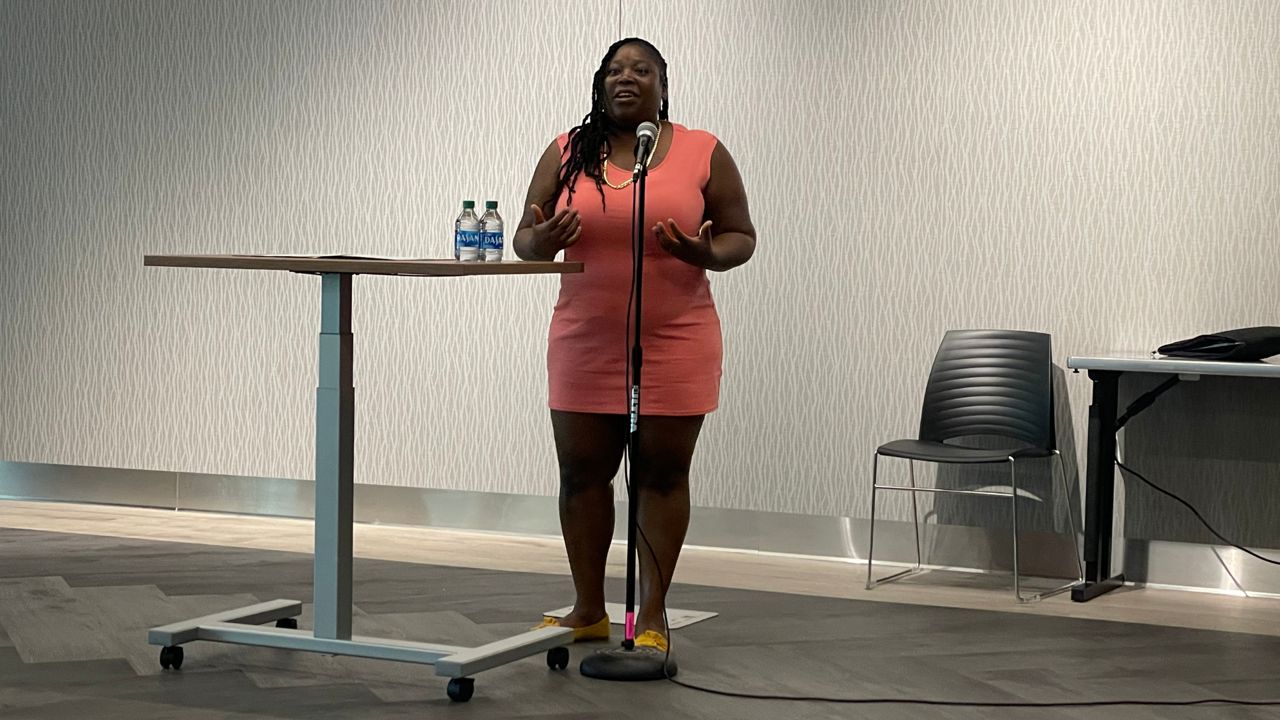ROUND ROCK, Texas — The official day for Juneteenth celebrations have passed, however, that doesn’t hinder people from making it a month-long commemoration to continue advancing people’s knowledge of this pivotal point in American history. The Round Rock Public Library, just nearly a year old, hosted a Juneteenth event on Saturday, with empowerment speaker Dr. Malissa Sanon Ismaila leading the program’s presentation.
“An Afternoon Tea with Malissa” was an interactive demonstration of how far we’ve come since June 19, 1865, and how far we still have yet to go. “We must know why we are celebrating and what we are celebrating for,” Ismaila stated during her speech.
On that day, the last enslaved African Americans in Galveston, Texas, were freed. But Major General Gordon Granger’s news of their freedom came two and a half years after then-President Abraham Lincoln’s Emancipation Proclamation that abolished slavery in confederate states. And it was through the 13th Amendment in 1865 that the proclamation became national policy, as there were people still enslaved.
Hundreds of years later, Juneteenth is a nationally celebrated holiday. Before President Joe Biden made Juneteenth a federal holiday, Black Texans for generations have memorialized this event as their ancestors’ true independence day.
Since Juneteenth has been nationalized, years of people’s ignorance to this important time in history is now being addressed. For many outside of Texas, they didn’t learn of Juneteenth until adulthood because it wasn’t a part of their school’s curriculum. But those willing to make up for that lack of education are front row and center at events like Ismaila’s.
When Ismaila moved to Texas from Fort Lauderdale, Florida, in 2022, accepting a job with South Western University as its director of diversity and student inclusion, the Georgetown community invited her to speak on Juneteenth. And just last week, she had another speaking engagement at the Georgetown Rotary Club. She’s been involved in higher education for 15 years.
“I think people are very receptive. They come to me and talk with me afterwards... I’m not a history buff, so I don’t have all the answers, but I’m not afraid to say ‘I don’t know,’” Ismaila said. And receptive they were. Conversations and questions were plentiful at Saturday’s afternoon event because of people’s genuine curiosity about a period in history many felt left in the dark about.
Leading interactive activities helped to create a friendly atmosphere where people of all races, age and backgrounds felt comfortable enough to take part in topics that could be considered sensitive to some. Everyone was very respectful of hearing one another out, with understanding being the end goal for these discussions.
One Texas woman is grateful for the attention that Juneteenth has now garnered. It used to just be something her family and church community treated as an especially intimate day of celebration.
“The way I grew up, we had a special way of celebrating [Juneteenth] because… that’s all we had. So, it was a big day for us. We didn’t do anything except celebrate,” said Sharon Wolf. “I think it’s just a long time coming for people to recognize and give credence to our holiday and for our freedom.”
With Haitian-born parents, Ismaila said she was taught from a young age about the country’s day of independence, the backstory of the flag’s colors, why they practiced certain traditions, etc. She couldn’t understand why America's school system was so tight-lipped as it related to history concerning Black Americans.
“In the American school system, I should have been taught the same things. Right? About our country, about how we stand, about how we look at freedom,” Ismaila expressed. She encouraged attendees to help with spreading the word about this history. “We don’t have to be political scientists. We don’t have to be history teachers. But we can be storytellers.” She said it’s the history that keeps not being told that hinders our ability to make social change.
In the coming year or so, people from everywhere will be able to visit a facility committed to the education of Juneteenth. Fort Worth’s historic Southside will be home to the National Juneteenth Museum, and it’s expected to be up by 2025.
Juneteenth symbolizes the early start toward healing from a dark time in America. And with racial tensions continuously bubbling over in 2023, most believe that this historical event should be just as important to everyone in America as it is to Texans.
“We have a long way to go,” said Ismaila. “Yes, we’re celebrating. This is a great time to be celebrating. We still can continue to do better as a society.”



